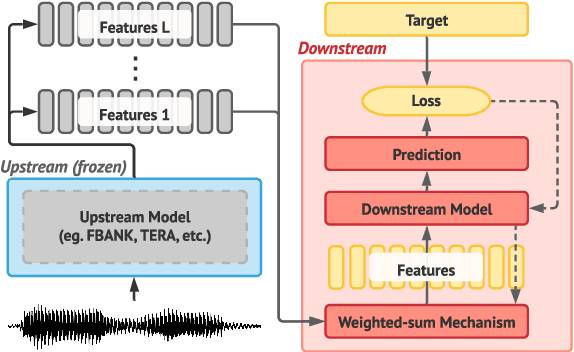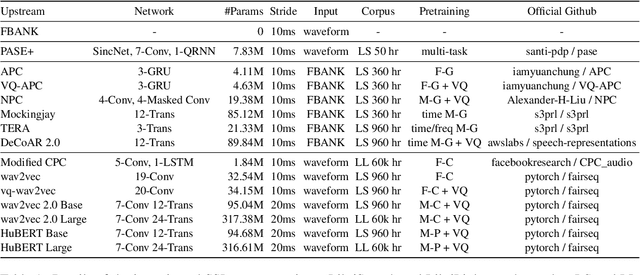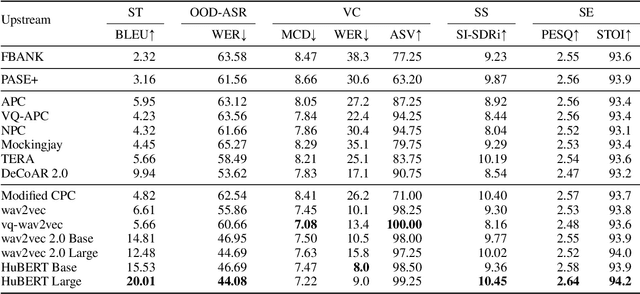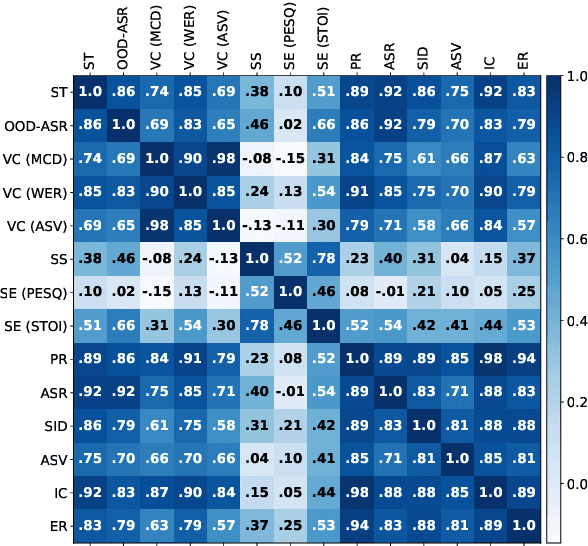Hsiang-Sheng Tsai
A Large-Scale Evaluation of Speech Foundation Models
Apr 15, 2024Abstract:The foundation model paradigm leverages a shared foundation model to achieve state-of-the-art (SOTA) performance for various tasks, requiring minimal downstream-specific modeling and data annotation. This approach has proven crucial in the field of Natural Language Processing (NLP). However, the speech processing community lacks a similar setup to explore the paradigm systematically. In this work, we establish the Speech processing Universal PERformance Benchmark (SUPERB) to study the effectiveness of the paradigm for speech. We propose a unified multi-tasking framework to address speech processing tasks in SUPERB using a frozen foundation model followed by task-specialized, lightweight prediction heads. Combining our results with community submissions, we verify that the foundation model paradigm is promising for speech, and our multi-tasking framework is simple yet effective, as the best-performing foundation model shows competitive generalizability across most SUPERB tasks. For reproducibility and extensibility, we have developed a long-term maintained platform that enables deterministic benchmarking, allows for result sharing via an online leaderboard, and promotes collaboration through a community-driven benchmark database to support new development cycles. Finally, we conduct a series of analyses to offer an in-depth understanding of SUPERB and speech foundation models, including information flows across tasks inside the models, the correctness of the weighted-sum benchmarking protocol and the statistical significance and robustness of the benchmark.
SUPERB-SG: Enhanced Speech processing Universal PERformance Benchmark for Semantic and Generative Capabilities
Mar 14, 2022



Abstract:Transfer learning has proven to be crucial in advancing the state of speech and natural language processing research in recent years. In speech, a model pre-trained by self-supervised learning transfers remarkably well on multiple tasks. However, the lack of a consistent evaluation methodology is limiting towards a holistic understanding of the efficacy of such models. SUPERB was a step towards introducing a common benchmark to evaluate pre-trained models across various speech tasks. In this paper, we introduce SUPERB-SG, a new benchmark focused on evaluating the semantic and generative capabilities of pre-trained models by increasing task diversity and difficulty over SUPERB. We use a lightweight methodology to test the robustness of representations learned by pre-trained models under shifts in data domain and quality across different types of tasks. It entails freezing pre-trained model parameters, only using simple task-specific trainable heads. The goal is to be inclusive of all researchers, and encourage efficient use of computational resources. We also show that the task diversity of SUPERB-SG coupled with limited task supervision is an effective recipe for evaluating the generalizability of model representation.
 Add to Chrome
Add to Chrome Add to Firefox
Add to Firefox Add to Edge
Add to Edge